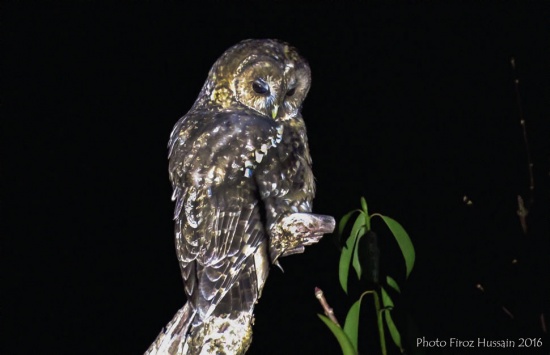- Strix nivicolum
Strix nivicola
Identification
L 35-40 cm (13¾-15¾)
A mid-sized, dark-eyed and earless owl.
Broadly banded wings and tail, double pale wing-bars and heavily mottled, feathered tarsi. Dark, black-rimmed facial disk with a pale X across the centre of the face. Unstreaked but heavily mottled and vermiculated upperparts with a broad pale-spotted hindcollar. Coarse dark streaks and cross-bars below.
Similar Species
Darker and more heavily marked than Tawny Owl.
Distribution
Found from Nepal to northeast India, southeast China, northern Burma, northern Indochina, northeast China, Korea and Taiwan.
Taxonomy
Subspecies
Three subspecies recognized[1]:
- S. n. nivicolum in the Himalayas of India, Nepal and east to southeast China, Burma and Vietnam.
- S. n. yamadae in southern Taiwan
- S. n. ma in northeast China and Korea
Was formerly considered conspecific with Tawny Owl.
Habitat
Coniferous forest, oak forest, especially in rocky forested ravines.
Behaviour
A purely nocturnal species, hiding in trees by day. Does not get close to humans.
Diet
Feeds on beetles, small birds and small mammals.
Breeding
Breeds in late winter and spring in a tree-hole or a rocky hollow.
References
- Clements, J. F., T. S. Schulenberg, M. J. Iliff, D. Roberson, T. A. Fredericks, B. L. Sullivan, and C. L. Wood. 2018. The eBird/Clements checklist of birds of the world: v2018. Downloaded from http://www.birds.cornell.edu/clementschecklist/download/
- Rasmussen, PC and JC Anderton. 2005. Birds of South Asia: The Ripley Guide. Barcelona: Lynx Edicions. ISBN 978-8487334672
Recommended Citation
- BirdForum Opus contributors. (2025) Himalayan Owl. In: BirdForum, the forum for wild birds and birding. Retrieved 26 April 2025 from https://www.birdforum.net/opus/Himalayan_Owl




